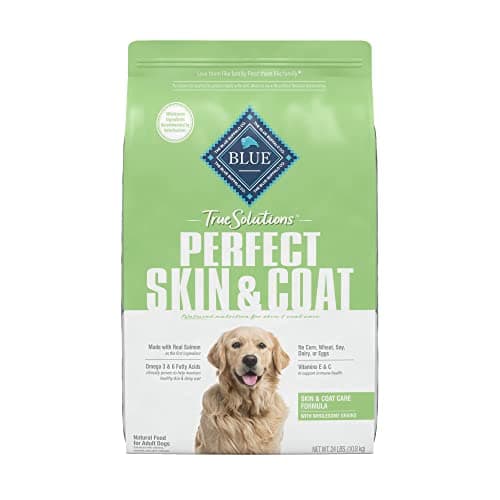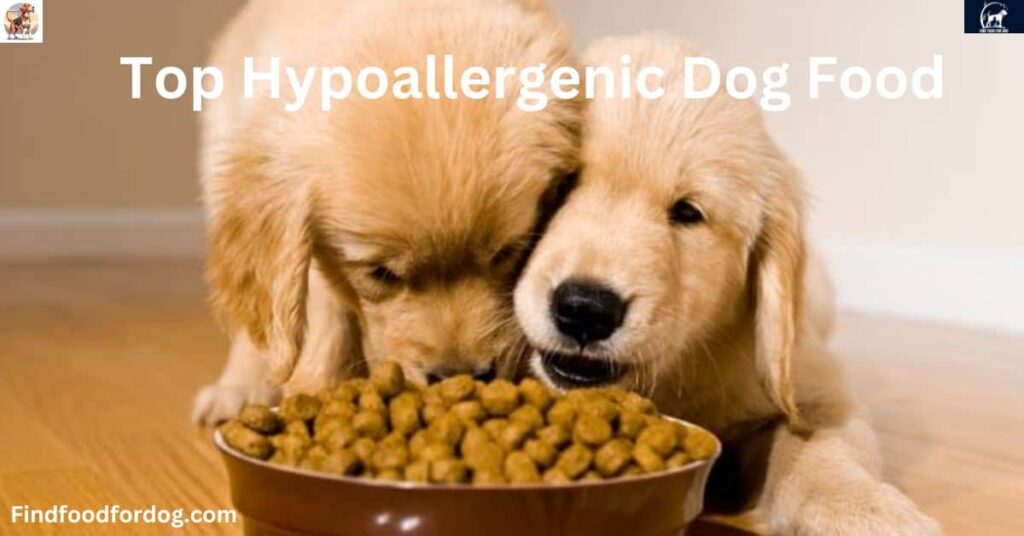Top hypoallergenic dog food includes brands like Royal Canin, Hill's Science Diet, and Blue Buffalo. These foods cater to dogs with food sensitivities and allergies.
Hypoallergenic dog food is designed for pets prone to allergies or sensitivities. It typically contains limited ingredients, making it easier for dogs to digest. Many brands focus on novel proteins, such as duck or venison, to reduce allergenic reactions. Grain-free options are also popular, as grains can trigger sensitivities in some dogs.
Selecting the right hypoallergenic food can improve your dog's overall health and well-being. Always consult with a veterinarian before making changes to your dog's diet. This ensures you choose the best option tailored to your pet's specific needs. Prioritizing your dog's diet can lead to a happier, healthier life.

The Importance Of Hypoallergenic Diets For Dogs
Many dogs suffer from food sensitivities. These can cause discomfort and health issues. A hypoallergenic diet helps manage these problems. It reduces the risk of allergic reactions. This type of diet uses limited ingredients. It focuses on proteins and carbohydrates that are less likely to cause allergies.
Identifying Food Sensitivities In Dogs
Recognizing food sensitivities in dogs is crucial. Here are some signs to watch for:
- Excessive itching or scratching
- Red, inflamed skin
- Digestive problems like diarrhea or vomiting
- Ear infections
- Loss of fur or dry skin
Keep a close eye on your dog's reactions to food. Note any changes in behavior or health. Consult your vet if you suspect food sensitivities.
Benefits Of Hypoallergenic Dog Food
Switching to a hypoallergenic diet offers several benefits:
| Benefit | Description |
|---|---|
| Reduced Allergies | Fewer allergic reactions and skin issues. |
| Improved Digestion | Better nutrient absorption and less digestive upset. |
| Healthier Skin | Less inflammation leads to healthier skin and coat. |
| Increased Energy | Proper nutrition boosts overall energy levels. |
Hypoallergenic dog food supports your dog's overall health. It makes a noticeable difference in their quality of life. A well-balanced diet promotes longevity and happiness.

Common Allergens In Dog Food
Many dogs suffer from food allergies. Understanding common allergens helps owners choose the right diet. Allergens can cause skin issues, digestive problems, and other health concerns. Identifying these allergens is crucial for your dog's well-being.
Proteins That Often Cause Reactions
Protein sources are common triggers for dog allergies. Here are the top proteins that can cause reactions:
- Beef
- Chicken
- Lamb
- Fish
- Dairy
Symptoms of protein allergies include:
- Itching
- Red or inflamed skin
- Ear infections
- Vomiting
Switching to hypoallergenic dog food can help reduce these symptoms.
Grains And Gluten Sensitivity
Grains can also trigger allergies in some dogs. Common grain allergens include:
- Wheat
- Barley
- Rye
- Corn
Some dogs may react to gluten as well. Signs of grain sensitivity include:
- Diarrhea
- Gas
- Weight loss
Choosing grain-free dog food can improve your dog's health.
How To Choose Hypoallergenic Dog Food
Choosing the right hypoallergenic dog food is essential. It helps pets with food sensitivities. Understanding the key ingredients is vital for their health.
Key Ingredients To Look For
Focus on these key ingredients:
- Novel Proteins: These are new protein sources for your dog.
- Limited Ingredients: Fewer ingredients reduce allergy risks.
- High-Quality Carbohydrates: Sweet potatoes and brown rice are great.
- Omega Fatty Acids: They support skin and coat health.
Check the ingredient list carefully. Avoid fillers and artificial additives. These can worsen allergies.
Understanding Protein Sources
Protein is crucial for your dog's diet. Choose unique protein sources to prevent allergies.
| Common Protein Sources | Hypoallergenic Protein Sources |
|---|---|
| Chicken | Duck |
| Beef | Venison |
| Fish | Rabbit |
| Eggs | Quail |
Try unique proteins like rabbit or venison. These options are less likely to cause allergies. Always consult your vet before making changes.
Top Hypoallergenic Dog Food Brands
Choosing the right hypoallergenic dog food can improve your pet's health. Many brands offer specialized formulas. These help dogs with food sensitivities thrive. Below are some top brands, categorized into premium and budget-friendly options.
Premium Choices For Sensitive Dogs
Premium hypoallergenic dog foods often contain high-quality ingredients. These brands focus on nutrition and digestibility. Here are some top choices:
| Brand | Main Ingredient | Key Benefits |
|---|---|---|
| Hill's Science Diet | Chicken | Veterinarian recommended, balanced nutrition |
| Royal Canin | Duck | Digestive support, tailored for allergies |
| Blue Buffalo | Salmon | Grain-free, natural ingredients |
Royal Canin
Hill's Science Diet
Blue Buffalo
Budget-friendly Hypoallergenic Options
Many pet owners seek affordable hypoallergenic dog foods. These budget-friendly options still provide good nutrition. Here are some reliable brands:
- Purina Pro Plan – Offers chicken and rice formulas.
Purina Pro Plan
- Nature's Receie – Made with whole foods, no synthetic additives.
Nature's Recipe
- Canidae – Simple recipes, suitable for sensitive stomachs.
Canidae PURE
Choosing the right food helps your dog live a happier life. Consider your dog's specific needs. Research each brand to find the best fit.
Homemade Hypoallergenic Dog Food
Creating homemade hypoallergenic dog food can be a rewarding experience. It allows you to control the ingredients and cater to your dog's specific needs. Many dogs suffer from allergies. Choosing the right food can improve their health and happiness.
Recipes For Sensitive Pups
Here are some easy recipes for your sensitive pup:
- Chicken and Rice
- 1 cup of cooked chicken (shredded)
- 1 cup of cooked white rice
- 1/2 cup of carrots (chopped)
- Turkey and Sweet Potato
- 1 cup of ground turkey
- 1 cup of cooked sweet potato (mashed)
- 1/2 cup of peas
- Beef and Quinoa
- 1 cup of ground beef (lean)
- 1 cup of cooked quinoa
- 1/2 cup of spinach (chopped)
Balancing Nutrition With Homemade Meals
Homemade meals should be balanced. Dogs need protein, carbs, and fats. Follow these tips for better nutrition:
| Ingredient | Purpose |
|---|---|
| Lean Meat | Provides protein for muscle health |
| Vegetables | Offers vitamins and minerals |
| Whole Grains | Supplies energy and fiber |
| Healthy Fats | Supports skin and coat health |
Consult your vet before changing your dog's diet. They can help ensure your pup gets all necessary nutrients. Homemade meals can be beneficial, but balance is key.
Transitioning To Hypoallergenic Dog Food
Changing your dog's diet to hypoallergenic food can be essential. It helps manage allergies and sensitivities. A smooth transition is key for your dog's health. Follow a step-by-step approach for the best results.
Steps For A Smooth Transition
- Choose the Right Food: Select a high-quality hypoallergenic dog food.
- Start Gradually: Mix the new food with the current food.
- Increase the New Food: Gradually increase the amount of hypoallergenic food.
- Monitor Portions: Keep portion sizes consistent during the transition.
- Stay Consistent: Stick to the new food for at least 8-10 days.
Monitoring Your Dog's Response
Watch your dog's reaction closely during the transition. Look for changes in behavior and health. Signs to monitor include:
- Skin Reactions: Check for itching or rashes.
- Digestive Issues: Watch for vomiting or diarrhea.
- Energy Levels: Notice any changes in activity.
Record any changes. This information helps your vet. Consult a veterinarian if you see any negative reactions.
Veterinarian Insight On Hypoallergenic Diets
Veterinarians provide crucial insights about hypoallergenic diets for dogs. They emphasize that not all dogs need such diets. Understanding your dog's specific needs is key. Allergies can show as skin issues or digestive problems. A proper diet can greatly improve their health and comfort.
When To Consult Your Vet
Consult your vet if you notice any of the following:
- Persistent itching or scratching
- Frequent ear infections
- Digestive issues like diarrhea or vomiting
- Skin rashes or hot spots
Take advice from Pet Expert Dr Marty
Early intervention helps manage allergies effectively. Your vet can recommend tests to identify allergens. This way, you can choose the right hypoallergenic food.
Professional Advice On Managing Allergies
Here are key points veterinarians recommend for managing allergies:
- Choose limited ingredient diets to minimize exposure to allergens.
- Consider novel protein sources, like duck or fish.
- Look for grain-free options if grains trigger reactions.
- Regularly monitor your dog's reaction to new foods.
- Work with your vet to adjust the diet as needed.
Veterinarians often suggest a gradual transition to new food. This reduces the risk of digestive upset. Keep notes on your dog's behavior and health during the switch. This information helps your vet tailor advice.
| Allergy Symptoms | Recommended Actions |
|---|---|
| Itching | Consult vet for skin tests. |
| Ear Infections | Check for food allergies. |
| Digestive Issues | Switch to hypoallergenic food. |
| Skin Rashes | Monitor diet changes. |
Understanding your dog's allergies is essential. Regular vet visits and open communication help in managing their health.

Blue Buffalo
Success Stories: Dogs Thriving On Hypoallergenic Food
Many dog owners have seen remarkable changes in their pets after switching to hypoallergenic dog food. Dogs with allergies often suffer from skin issues, digestive problems, and overall discomfort. This section highlights real-life success stories of dogs thriving on hypoallergenic diets.
Case Studies
Here are some compelling case studies showcasing the benefits of hypoallergenic dog food:
| Dog Name | Before Hypoallergenic Food | After Hypoallergenic Food |
|---|---|---|
| Bella | Frequent scratching, red patches | Shiny coat, no itching |
| Max | Stomach issues, vomiting | Regular digestion, happy energy |
| Rocky | Ear infections, bad odor | Clear ears, fresh smell |
Owner Testimonials
Dog owners share their experiences with hypoallergenic food:
- Sarah: “Bella's itching stopped within a week. She's so happy now!”
- John: “Max is back to his playful self. No more stomach issues!”
- Amy: “Rocky's ear infections disappeared. His coat looks amazing!”
These stories highlight the positive impact of hypoallergenic dog food. Many dogs experience improved health and happiness. Switching can make a significant difference.
Frequently Asked Questions About Top Hypoallergenic Dog Food
What Is Hypoallergenic Dog Food?
Hypoallergenic dog food is specially formulated to minimize allergic reactions in dogs. It typically contains limited ingredients and avoids common allergens like beef, chicken, and dairy. This type of food is ideal for dogs with sensitivities, promoting better digestion and overall health.
How Do I Know If My Dog Needs Hypoallergenic Food?
Signs that your dog may need hypoallergenic food include persistent itching, skin irritations, or digestive issues. If you notice these symptoms, consult your veterinarian. They can recommend appropriate dietary changes and help identify specific allergens affecting your dog.
What Are The Best Ingredients In Hypoallergenic Dog Food?
The best ingredients in hypoallergenic dog food include novel protein sources like duck or fish, and easily digestible carbohydrates like sweet potatoes. Limited ingredient diets are often beneficial. Always check for high-quality ingredients that support your dog’s overall health and well-being.
Can Hypoallergenic Dog Food Improve My Dog’s Health?
Yes, hypoallergenic dog food can significantly improve your dog’s health. By reducing exposure to allergens, it can alleviate symptoms like itching and digestive upset. A proper diet tailored to your dog's needs promotes better energy levels, coat health, and overall quality of life.
Conclusion
Choosing the right hypoallergenic dog food can significantly improve your pet's health. Prioritize high-quality ingredients and consult your vet for personalized recommendations. A proper diet helps manage allergies and promotes overall well-being. Your furry friend deserves the best, so invest time in finding the perfect food for them.




















